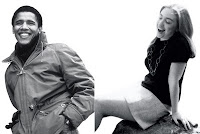 This blog gives extensive attention to elite rule over the rest of us via the Democratic party (examples here and here). Similar views receive widespread coverage elsewhere, though rarely in the depth Boston University’s Angelo M. Codevilla provided in his 11,000-plus word essay on the ruling class. I’ve condensed Codevilla’s essay into three blog posts, beginning with his thoughts on ruling class power:
This blog gives extensive attention to elite rule over the rest of us via the Democratic party (examples here and here). Similar views receive widespread coverage elsewhere, though rarely in the depth Boston University’s Angelo M. Codevilla provided in his 11,000-plus word essay on the ruling class. I’ve condensed Codevilla’s essay into three blog posts, beginning with his thoughts on ruling class power:Today's ruling class. . . was formed by an educational system that exposed them to the same ideas and gave them remarkably uniform guidance. . . a social canon of judgments about good and evil, complete with secular sacred history, sins (against minorities and the environment), and saints. Using the right words and avoiding the wrong ones when referring to such matters . . . serves as a badge of identity. Regardless of what business or profession they are in, their road up included government channels and government money because, as government has grown, its boundary with the rest of American life has become indistinct.
while most Americans pray to [God], our ruling class prays to itself as "saviors of the planet" and improvers of humanity. Our classes' clash is over "whose country" America is, over what way of life will prevail, over who is to defer to whom about what. The gravity of such divisions points us, as it did Lincoln, to Mark's Gospel: "if a house be divided against itself, that house cannot stand."
the ruling class has a party, the Democrats. . . . They vote Democrat . . . consistently. . . draw their money and orientation from the same sources as the millions of teachers, consultants, and government employees in the middle ranks who aspire to be the [ruling class]. . . few speak well of the ruling class. [It has] presided over a declining economy and mushrooming debt, made life more expensive, raised taxes, and talked down to the American people. Americans' conviction that the ruling class is as hostile as it is incompetent has solidified.
Like a fraternity, [the ruling] class requires above all comity -- being in with the right people, giving the required signs that one is on the right side, and joining in despising the Outs. Once an official or professional shows that he shares the manners, the tastes, the interests of the class, gives lip service to its ideals and shibboleths, and is willing to accommodate the interests of its senior members, he can move profitably among our establishment's parts.
membership in the ruling class [doesn’t] depend on high academic achievement. [France is] an academic meritocracy . . . where elected officials have little power, a vast bureaucracy explicitly controls details from how babies are raised to how to make cheese, and people get into and advance in that bureaucracy strictly by competitive exams. . .France's ruling class are bright people -- certifiably. . .while getting into the Ecole Nationale d'Administration . . . requires outperforming others in blindly graded exams, and graduating . . . requires passing exams that many fail, getting into America's "top schools" is less a matter of passing exams than of showing up with acceptable grades and an attractive social profile.
[The] ruling class[‘s] first tenet is that "we" are the best and brightest while the rest of Americans are retrograde, racist, and dysfunctional unless properly constrained. How did this replace the Founding generation's paradigm that "all men are created equal"? The notion of human equality was always a hard sell, because experience teaches us that we are so unequal in so many ways, and because making one's self superior is so tempting . . . But human equality made sense to our Founding generation because they believed that all men are made in the image and likeness of God, [and] because they were yearning for equal treatment under British law. . .
[After Darwin], the educated class's religious fervor turned to social reform: they were sure that because man is a mere part of evolutionary nature, man could be improved, and that they, the most highly evolved of all, were the improvers. Thus began the Progressive Era. The Progressives. . . found it fulfilling to attribute the failure of their schemes to the American people's backwardness, to something deeply wrong with America. The American people had failed them because democracy in its American form perpetuated the worst in humanity. Thus Progressives began to look down on the masses, to look on themselves as the vanguard, and to look abroad for examples to emulate.
Franklin Roosevelt . . . described America's problems in technocratic terms. America's problems would be fixed by a "brain trust" (picked by him). His New Deal's solutions -- the alphabet-soup "independent" agencies that have run America ever since -- turned many Progressives into powerful bureaucrats and then into lobbyists.
Our ruling class's agenda is power for itself. While it stakes its claim through intellectual-moral pretense, it holds power [via] patronage and promises thereof. . . it is a "machine”. . . providing tangible rewards to its members. . . whatever else such parties might accomplish, they must feed the machine by transferring money or jobs or privileges -- civic as well as economic -- to the party's clients. . . Hence our ruling class's standard approach to any and all matters. . . is to increase the power of the government -- meaning of those who run it, meaning themselves. . .


No comments:
Post a Comment